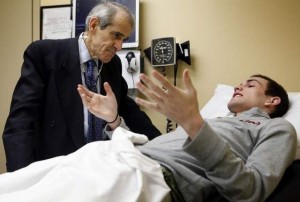Muslim Doctors Promote Harmony with Free Clinic in Cincinnati
At Thanksgiving 2009, when he had to be rushed to the emergency room at Mercy Hospital Anderson, a nurse referred him to a free clinic that had just opened in the adjacent medical office building.
The Muslim Clinic of Ohio, Cincinnati Chapter, now known as the Mercy Care Clinic, was started by a group of local Muslim physicians.
“I think a lot of the American public sees the news and thinks if they see a Muslim that they’re automatically a terrorist,” said Bowling, 53, of Anderson Township.
The Muslims Bowling knows are dedicated physicians volunteering their time to care for him and providing him with life-saving medicine. They’ve given him Kroger pharmacy cards, redeemable for $4 prescriptions, and a referral to St. Vincent de Paul Society’s free pharmacy in the West End.
“I’d really be struggling without the clinic,” said Bowling.
The Muslim doctors want to expand the clinic’s hours and its ability to provide medicine to meet a growing need.
Bowling’s physician is Tariq Sultan, a Pakistani-born Muslim and internist at Mercy Anderson. Sultan was one of the clinic’s founders – it opened in July 2009 – and one of the region’s 140 Muslim physicians who had volunteered individually or in small groups at other clinics serving the poor.
The doctors wanted to serve the larger community and, in Sultan’s words, satisfy the fourth pillar of Islam – zakat, giving to and serving the poor.
“Everyone believes in heaven and hell,” Sultan said. “If you do good deeds you grow closer to God. You move forward.”
The doctors wanted, too, to do their part to chip away at negative stereotypes of Islam in America.
Mercy Care Clinic is based on the model of a free clinic opened in 1996 in California by Muslim doctors.
Five years before self-identified Muslim radicals masterminded and carried out the 9/11 attacks, Muslim physicians in Los Angeles wanted to create a “more positive view of Islam” and provide volunteer opportunities.
“We all are children of God,” said Seyed Moussavian, an Iranian-born gastroenterologist with a practice in Montgomery and a local clinic founder.
Moussavian is one of the specialists who frequently works a shift – the clinic is open 5-8 p.m. Thursdays – or takes patient referrals from other Muslim clinic doctors. The clinic uses the offices and examination rooms of the Mercy Hospital obstetrics suite.
An average of 25 patients is seen each week in the borrowed space.
The clinic network has grown to include cardiologists, pulmonologists, surgeons and orthopedists, non-Muslim and Muslim alike, born in Syria, Egypt and Lebanon.
Through March, the Muslim Clinic has provided 900 appointments to some 500 individuals.
Bowling and Steven Stiles, 23, of Morrow, are among the patients who receive continuous care at the clinic.
Unemployed and without health insurance, Stiles has celiac disease, which disrupts the absorption of nutrients in the small intestine and can cause severe abdominal pain and lethargy.
Moussavian has helped Stiles structure a strict gluten-free diet to help control symptoms.
“I can’t afford to go anywhere else,” said Stiles.
On Thursday night, Moussavian and Stiles celebrated Stiles’ 7-pound weight gain since his previous month’s visit, even though he complained about reduced sensation in his hands.
“He spends a lot of time with me. He’s like family,” said Stiles, who doesn’t see his doctor as a Muslim. He said he just sees someone treating him with skill, gentleness and patience.
Said Moussavian, “It is sad that religion, which should bring us together, has done so much to pull us apart.”
Mercy Care Clinic is an antidote. It is a joint effort of people from two major religions – Islam and Catholicism.
Muslim physicians approached executives at Mercy Anderson with the idea of a free clinic.
Dan Roth, the hospital’s former vice president of medical affairs, took the concept to hospital chief executive Patricia Schroer.
“We saw the possibilities,” said Sister Mary Lou Averbeck, the hospital’s mission integration director.
“We want to care for people who are poor and underserved.”
Involved from the beginning, and a driving force to get a $25,000 grant for the clinic from Catholic Health Partners, Averbeck never lost sight of the potential for cultural and religious understanding.
“We serve the same God,” she said. “We’ve done a lot together.”
They would like to do more. More space and clinic days are needed. Mercy Care Clinic would like to secure more financial donations and work for more grants. More volunteers – doctors, nurses and clerical – are needed. The clinic has one paid employee, coordinator Joanne Floyd.
The need is great because of the tough economic times and the number of people who have lost jobs and health insurance.
“People are hurting,” said volunteer Suhail Chaudhry, a Pakistani-born internal-medicine specialist with a private practice in Harrison.
He drives 45 minutes each way from the western edge of Hamilton County to the East Side to treat clinic patients, only about 10 percent of whom are Muslim.
The rest are Jewish and mostly Christian, like Jean Houck, 60, of Loveland. Unable to work for the past five years because of deteriorating health, she said the clinic has helped her deal with hypertension, high blood pressure and several stomach and digestive problems.
She is able to get prescription medicine regularly now.
“As far as any doctoring I’ve ever gotten in my life,” she said, “this is the most respect I’ve ever been treated with.”



















